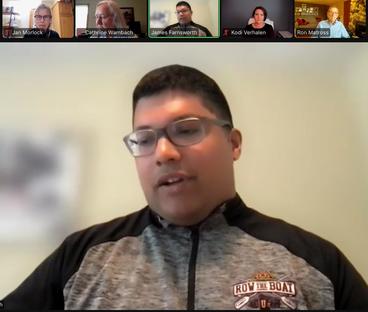UMRA welcomes first-year Regents Verhalen and Farnsworth
Thirty members of UMRA met with first-year Regents Kodi J. Verhalen and James T. Farnsworth via Zoom on May 31 for an engaging conversation about the critical issues currently facing the University and the important role that retirees can play in supporting the University’s mission.
The meeting was convened by UMRA President Jan Morlock with support from President-elect Ron Matross and Cathrine Wambach, UMRA’s liaison to the Board of Regents. Technology support was provided by UMRA Webmaster Cathy Lee Gierke.
Regent Verhalen was elected to represent Congressional District 6 and lives in Elk River. She is an alumna of the University of Minnesota Duluth where she earned a degree in chemical engineering. She later earned a J.D. from Mitchell Hamlin School of Law. She has remained engaged with the U of M Duluth engineering program and has held leadership positions in engineering professional organizations. In addition, she supports programs related to children’s health including the M Health Fairview University of Minnesota Masonic Children’s Hospital. Her legal work as a partner at Taft Law is focused on energy and environmental issues.
Regent Farnsworth was elected to represent Congressional District 4 and lives in St. Paul. He grew up in the Seward neighborhood of Minneapolis in the shadow of the U of M Twin Cities campus. While at the U as an undergraduate he became active in student governance. He now serves as the executive director of the Highland Business Association, and previously worked in various roles in non-profits, state government, and the private sector.

Regents Verhalen and Farnsworth were given a set of questions in advance of the meeting. The first asked them to describe their motives for joining the Board of Regents. Verhalen said she was moved by her experience of engagement with UMD’s chemical engineering program to find a way to support the U of M mission more broadly. She hopes the excellence of the institution is preserved for the benefit of her young daughter and other future students. Regent Farnsworth talked about the impact of his experience in student governance on his desire to participate in broader institutional governance.
The second topic addressed by the new regents was their perception of the critical issues facing the University. Verhalen described the difficult financial situation, with inflation raising costs, competition for workers increasing salaries, and limits to the amount tuition can be raised. During COVID tuition was kept stable and workers experienced wage and hiring freezes, she said. Those strategies are no longer tenable.
Financial challenges and a shifting landscape
Farnsworth agreed the financial situation is challenging, and said the shifting higher education landscape creates additional challenges including an increased need for student mental health services and the evolving role of technology in teaching and learning. He noted that the expectations of students, parents, and faculty are changing and achieving success will require understanding these perspectives. He said the Systemwide Strategic Plan is a good place to start.
The third topic addressed was the role of retirees in supporting the mission of the University. Both regents agreed that retirees with practical experience should share their perspectives on what worked and didn’t work in the past. Letters and testimony at meetings can be effective ways of doing this.
Several additional questions were raised by participants in the meeting. One asked how the regents can keep focused on the University of Minnesota System rather than just the Twin Cities campus. Both spoke to the value of visits to system campuses to experience their uniqueness and said that although the regents meet on the Twin Cities campus, Board of Regents policies are system-wide.
Another participant asked if structural changes will be necessary to address our ongoing challenges. Verhalen described what Provost Croson is doing to learn what teachers and learners are expecting going forward. She also pointed to The PEAK Initiative, which is identifying ways to cut administrative costs by consolidating services across campuses. Regent Farnsworth noted the work being done on the next version of the U of M’s liberal education requirements. Can these requirements be more responsive to emerging student expectations while retaining faculty autonomy on course delivery?
The final question concerned how our increasingly divided political environment affects the Board of Regents. Farnsworth said the relationship between the Board and the Minnesota Legislature was important, as are transparency and accountability with the public. The Board needs to have good collaborative relationships with members of both political parties.
Regent Verhalen said that once a regent is elected, his or her duty is to the University, not to the Legislature. The University was established before Minnesota became a state and, while people in the 19th century would not have imagined an institution of our size and complexity, its autonomy must be preserved.
The UMRA Board extends its thanks to Regents Farnsworth and Verhalen and all the participants for an informative meeting.
—Cathrine Wambach, UMRA liaison to the Board of Regents